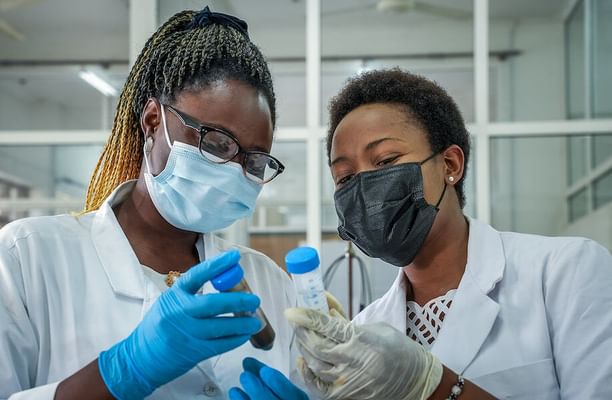- Undergraduate
Bachelor's Degrees
Bachelor of ArtsBachelor of EngineeringDual-Degree ProgramUndergraduate AdmissionsUndergraduate Experience
- Graduate
Graduate Experience
- Research
- Entrepreneurship
- Community
- About
-
Search
All Thayer News

Dartmouth Engineering Enters Third Year of Online Education Partnership with BioInnovate Africa
Oct 31, 2022
Dartmouth Engineering is entering its third year of collaboration with BioInnovate Africa of the International Centre of Insect Physiology and Ecology (icipe) to provide training in technoeconomic analysis (TEA) of innovation projects in Eastern Africa.

(l to r) icipe-supported PhD students Linda Bih Numfor of Cameroon and Ruth Lorivi Moirana of Tanzania conduct research on, respectively, heavy metal removal from biowaste material, and ways to detect contaminants in the soil and their impact on crop yield. (Photo courtesy of icipe)
"Remote-visiting students from East Africa take a two-course sequence, ENGS 157 [Chemical Process Design] and ENGS 172.2 [Technoeconomic Analysis in a Developing Country Context], during the Winter and Spring terms alongside Dartmouth students," says Professor Mark Laser who co-leads the program with Professor Lee Lynd.
The course sequence, which takes approximately six-months, aims to build the capability to assess the potential of early-stage bio-based technologies with real-world applications in developing countries.
"We deliver the TEA course using a combination of asynchronous prerecorded material and in-class Zoom sessions, as well as homework assignments, reflections by guest speakers from varied fields of profession, a term project, and a final exam," says Lynd.
The curriculum addresses the application of TEA to evaluate the profitability and broader social and environmental impact of potential business ventures involving technologies located in developing countries. It also provides in-depth exposure to the design of processes featuring chemical and biochemical transformations including integration of unit operations, simulation of system performance, sensitivity analysis, system-level optimization, and process economics and investment return.
"Expanding TEA capabilities within Eastern Africa supports evaluation of the various BioInnovate Africa-supported projects, enabling BioInnovate Africa to quantify impact of each project or technology," says Dr Julius Ecuru, head of BioInnovate Africa.
The courses consider aspects that most developing countries face such as inadequate infrastructure, financing limitations, and weaknesses in the enforcement of government policies and standards and enables students to participate in improving these systems in their respective localities using TEA concepts.
"As a result, students undertaking the course are able to learn valuable experiences that have potential to help spawn sustainable project development in their countries and enhance the wellbeing of many," says Laser.
Eligible applicants are students enrolled in a master's or PhD program at a university in any of the Eastern African countries of Burundi, DR Congo, Ethiopia, Kenya, Rwanda, South Sudan, Tanzania, and Uganda. So far, eight students have completed the course in cohort I (January to June 2021) and cohort II (January to June 2022).
Student Testimonials
"Having undertaken technological units during both my undergraduate and master's degree programs, I was eager to grasp new ideas in addition to sharing a scientific platform with various students from different parts of the world. From the skills and knowledge acquired during the course, I plan to collaborate with a fellow PhD student to conduct a life cycle assessment test on his project involving the 'de-haring of animal skin using enzymes for upscale in the industry.'"
Brenda Atieno Okoko, University of Nairobi
"The course came at a time when I was trying to investigate feasibility of the technology of bio-oil generation from rice husk waste. The first semester covered economic analysis and profitability assessment, and I learnt about the money aspect and that a successful project should wholesomely and in a sustainable way benefit the community, conserve their social setting, and preserve the environment. In the second semester, we heard and learnt from experienced guest speakers who are positively impacting change in communities around the world. Through the course, I gained knowledge in model engineering and chemical processes, and I am able to carry out socio-economic and environmental analyses of projects in any sector."
Joel Wakatuntu, Uganda
"At the time of application, we had a research topic related to the feasibility study of biogas generation by the conversion of municipal waste in Bujumbura. I had an opportunity to apply what I learnt from the course in a TEA study for a BioInnovate Africa project titled 'Disinfestation of fruits and vegetables using hot water immersion treatment technique.' I plan to collaborate more with researchers to apply the knowledge acquired from the course."
Nadege Mugisha, University of Burundi
"We covered interesting topics such as the use of the Aspen software and how to use it, various reactor types, process flow diagrams, energy and material balance, and separation design among others. Through the course, I also managed to link up and form networks with people from all over the world. I made friends with other students from Brazil, Burundi, Ethiopia, and the USA. In the near future, when I have raised some capital, I plan on starting my own industry and put into use the information obtained from the TEA course."
Sammy Kiplagat Chebon, University of Nairobi
"From the course, I learnt new skills, including how to generate leading questions that guide the final assessment of any business venture. The course provided detailed study about modeling the questions, conducting a material and energy balance, and the economics of the business. The knowledge shared guides me as I continue my work involving fruit wastes (peels) for biogas production, and energy generation from agricultural wastes."
Tadeo Mibulo, Makerere University, Uganda
For contacts and other media information visit our Media Resources page.
